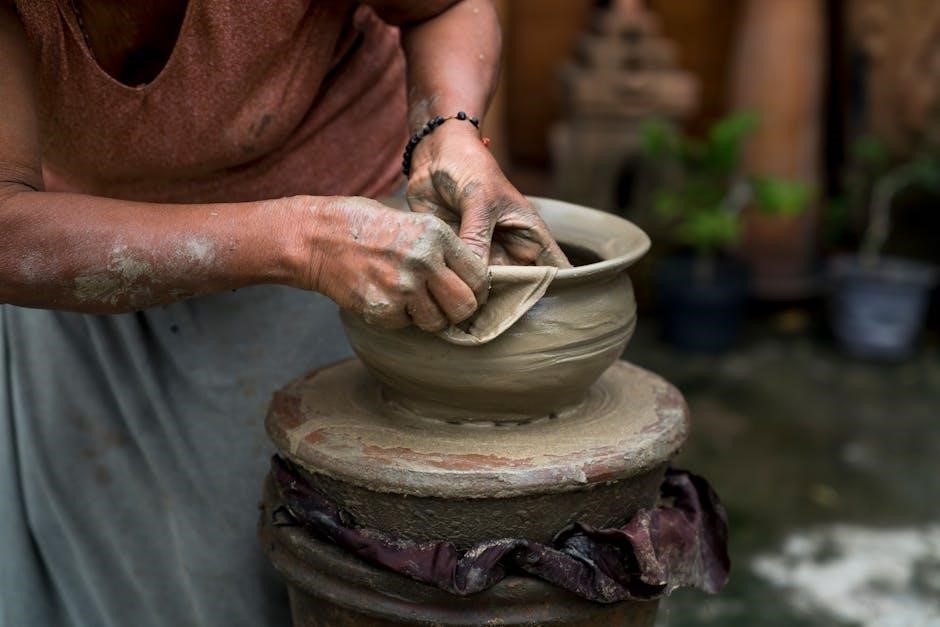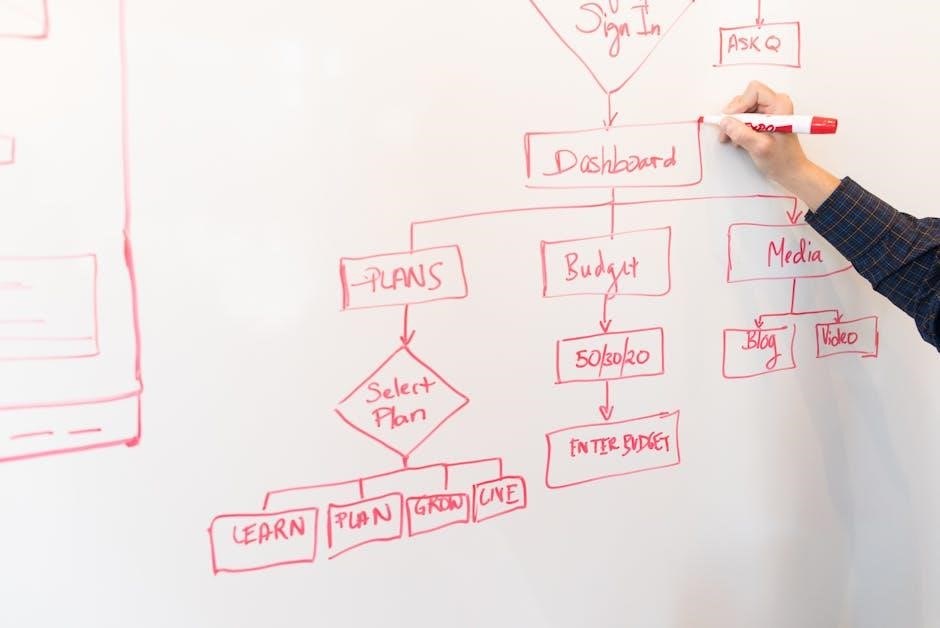The Manual to Manhood is a transformative guide blending traditional values with modern perspectives, helping men navigate societal expectations, self-improvement, and emotional intelligence in today’s evolving world․
Definition of Manhood
Manhood is a dynamic concept blending strength, vulnerability, and responsibility․ It encompasses societal expectations, emotional intelligence, and resilience, evolving beyond traditional stereotypes to embrace empathy and authenticity․ The Manual to Manhood guides men in navigating these complexities, fostering growth and understanding in a changing world․
Evolution of Masculinity in Modern Times
Masculinity has evolved significantly in recent years, shifting from rigid stereotypes to a more fluid understanding of manhood․ The Manual to Manhood reflects this change, emphasizing emotional expression, vulnerability, and adaptability․ Modern men are encouraged to embrace a balanced identity, combining strength with empathy, and rejecting harmful notions of aggression and dominance․ This shift is driven by societal changes, including gender equality movements and increased awareness of mental health․ The Manual to Manhood serves as a guide for men to navigate these evolving expectations, fostering personal growth and healthier relationships․ By addressing these changes, it helps men redefine what it means to be a man in today’s world․

Understanding the Foundations of Masculinity
Masculinity is rooted in societal norms, cultural influences, and personal identity, shaping how men perceive their roles and responsibilities in both traditional and modern contexts․
Traditional vs․ Modern Perspectives on Manhood
Traditional masculinity often emphasizes strength, stoicism, and providing, while modern perspectives highlight emotional intelligence, vulnerability, and adaptability․ Historically, men were expected to embody assertiveness and control, avoiding expressions of weakness․ In contrast, contemporary views encourage men to embrace empathy, communication, and shared responsibilities․ This shift reflects changing societal expectations and the breaking down of rigid gender roles․
Modern perspectives recognize the importance of emotional expression and vulnerability, challenging the outdated notion of men as solely providers․ This evolution promotes a more holistic understanding of manhood, blending resilience with sensitivity․ By bridging traditional and modern ideals, men can foster healthier relationships and personal growth in today’s dynamic world․
The Role of Societal Expectations in Shaping Masculinity
Societal expectations profoundly influence how men perceive and express masculinity․ Traditional roles often emphasize strength, dominance, and provider status, while modern expectations encourage emotional expression and vulnerability․ Media, culture, and community norms play a significant role in shaping these ideals, often creating pressure for men to conform․
These expectations can lead to stress and identity conflicts, as men navigate between meeting external demands and staying true to themselves․ Redefining masculinity involves challenging rigid norms and embracing a more inclusive understanding of what it means to be a man․ By recognizing and addressing these societal influences, men can develop a healthier, more authentic sense of self․
Biological and Psychological Aspects of Manhood
Manhood is deeply intertwined with biological and psychological traits that shape male identity․ Hormones like testosterone influence physical development, aggression, and competitiveness, which are often linked to traditional masculine roles․ Psychologically, men are often expected to exhibit assertiveness, resilience, and decision-making abilities․ These traits are partly innate but also shaped by societal conditioning․
Modern psychology highlights the importance of emotional intelligence and adaptability in defining manhood․ While biological factors provide a foundation, psychological growth allows men to navigate complex emotional landscapes and redefine strength beyond stereotypes․ Balancing these aspects fosters a holistic understanding of masculinity, blending innate characteristics with evolving personal and societal expectations․ This integration is essential for modern male identity․

Self-Improvement and Personal Growth
Self-improvement and personal growth are vital for modern manhood․ They involve cultivating self-awareness, emotional intelligence, and resilience, empowering men to thrive in personal and professional lives․
Importance of Self-Awareness in Masculinity
Self-awareness is a cornerstone of modern masculinity, enabling men to understand their strengths, weaknesses, and emotions․ It fosters personal accountability, better decision-making, and healthier relationships․ By recognizing their values and beliefs, men can align their actions with their true selves, leading to authenticity and integrity․ Self-awareness also helps men navigate societal expectations critically, embracing traits that empower them while rejecting harmful stereotypes․ It promotes emotional intelligence, resilience, and adaptability, which are essential for growth in both personal and professional realms․ Cultivating self-awareness allows men to lead with empathy and confidence, defining masculinity on their own terms and fostering a more balanced, evolving understanding of what it means to be a man․
Building Emotional Intelligence
Emotional intelligence (EI) is a vital skill for modern men, enabling them to navigate relationships, communicate effectively, and lead with empathy․ It involves recognizing, understanding, and managing one’s emotions while being attuned to the feelings of others․ Developing EI enhances self-awareness, allowing men to respond thoughtfully rather than react impulsively․ This fosters deeper connections, resolves conflicts, and builds trust․ Cultivating EI also empowers men to express vulnerability, challenging outdated notions of stoicism․ By mastering emotional intelligence, men can embrace a more balanced and compassionate form of masculinity, leading to stronger relationships and greater personal fulfillment․ It’s a cornerstone of emotional and social competence in today’s world․
Cultivating Resilience and Mental Toughness
Resilience and mental toughness are essential traits for modern men, enabling them to face adversity with confidence and perseverance․ Resilience is the ability to recover from setbacks, while mental toughness involves maintaining focus and composure under pressure․ These qualities help men navigate life’s challenges, whether personal or professional․ Developing resilience involves embracing failure as a learning opportunity and fostering a growth mindset․ Mental toughness is cultivated through discipline, consistent effort, and a clear sense of purpose․ By strengthening these traits, men can build the inner strength needed to overcome obstacles, adapt to change, and achieve their goals․ These qualities are foundational for personal growth and long-term success in all areas of life․

Physical and Mental Health
Physical and mental health are cornerstone pillars of modern manhood, ensuring vitality and well-being․ Prioritizing fitness, nutrition, and mental wellness fosters resilience and clarity, enhancing overall quality of life․

The Role of Fitness in Modern Manhood
Fitness plays a vital role in modern manhood, serving as a cornerstone for physical resilience and mental clarity․ Regular physical activity fosters strength, endurance, and overall well-being, while also enhancing emotional stability and confidence․ In today’s fast-paced world, fitness is not just about achieving a strong physique but also about building discipline and a growth mindset․ It encourages men to set and achieve goals, fostering a sense of accomplishment and self-improvement․ Moreover, fitness promotes mental health by reducing stress and anxiety, helping men navigate life’s challenges with greater ease․ By prioritizing fitness, modern men embody a balanced and holistic approach to masculinity, aligning physical health with emotional and mental well-being․
Nutrition and Wellness for Men
Nutrition and wellness are essential components of modern manhood, directly impacting energy levels, mental clarity, and overall vitality․ A balanced diet rich in essential nutrients, including proteins, vitamins, and minerals, supports physical health and longevity․ Men should prioritize whole foods like lean meats, fish, fruits, and vegetables, while minimizing processed and sugary items․ Proper hydration and mindful eating habits are also crucial for maintaining optimal health․ Additionally, understanding individual nutritional needs, such as calorie intake and macronutrient balance, helps men fuel their bodies effectively․ By making informed dietary choices, men can enhance their physical performance, support mental well-being, and embody a proactive approach to health, aligning with the principles of modern masculinity․
Mental Health Awareness and Self-Care
Mental health awareness and self-care are vital for men to thrive in today’s fast-paced world․ Traditional notions of masculinity often discouraged open discussions about emotional struggles, but modern manhood embraces vulnerability and proactive mental well-being․ Men should prioritize self-care practices such as mindfulness, stress management, and seeking support when needed; Recognizing signs of mental health challenges, like anxiety or depression, is the first step toward healing․ Building a support network, engaging in regular exercise, and practicing gratitude can significantly improve mental resilience․ By fostering emotional openness and prioritizing mental health, men can lead more balanced, authentic lives and set a positive example for others․ Self-care is not a sign of weakness but a strength that enhances overall well-being․

Communication and Relationships
Effective communication and healthy relationships are cornerstone of modern manhood․ Active listening, empathy, and clarity foster trust and understanding, strengthening personal and professional connections․ Aligning words with actions builds respect and intimacy, essential for meaningful relationships․
Effective Communication Skills for Men
Effective communication is a cornerstone of modern manhood, fostering stronger relationships and leadership․ Active listening, clarity, and emotional awareness are key․ Men should strive to express thoughts clearly, avoiding aggression or passivity․ Non-verbal cues, such as body language and eye contact, convey confidence and sincerity․ Practicing empathy and asking open-ended questions encourages deeper connections․ Managing emotions during conversations prevents miscommunication and conflict․ Learning to articulate feelings respectfully enhances trust and understanding․ Adapting communication styles to different audiences ensures messages are received effectively․ Mastering these skills builds respect, strengthens bonds, and promotes mutual growth in personal and professional relationships․
- Practice active listening and empathy․
- Express thoughts clearly and calmly․
- Be aware of non-verbal cues․
- Adapt communication to the audience․
Understanding Emotional Needs in Relationships
Understanding emotional needs is vital for building and maintaining healthy, fulfilling relationships․ Men must recognize that emotional connection is as important as physical or intellectual bonding․ Active listening and empathy are essential to comprehend a partner’s feelings and desires․ Validating emotions, rather than dismissing them, fosters trust and intimacy․ Men should also communicate their own emotional needs clearly to avoid misunderstandings․ Emotional intelligence helps navigate conflicts and strengthens mutual understanding․ Prioritizing quality time and expressing appreciation are practical ways to meet emotional needs․ By addressing these needs, men can create a supportive and nurturing environment, leading to deeper, more meaningful connections․
- Recognize the importance of emotional connection․
- Practice active listening and empathy․
- Communicate personal emotional needs clearly․
- Validate and support your partner’s feelings․
Building and Maintaining Healthy Relationships
Building and maintaining healthy relationships requires effort, dedication, and mutual respect․ Trust and communication are the cornerstones of any successful relationship․ Men should strive to create a safe, supportive environment where both partners feel valued and heard․ Shared values and goals help align expectations and foster teamwork․ Regularly addressing conflicts calmly and seeking solutions together strengthens the bond․ Commitment and loyalty are essential, as they provide a foundation of reliability․ Expressing gratitude and affection consistently nurtures the relationship․ Setting boundaries while encouraging personal growth ensures a balanced partnership․ Quality time, whether through meaningful conversations or shared activities, keeps the connection strong․ Adaptability and resilience are key to overcoming challenges together․
- Establish trust and respect as the foundation․
- Communicate openly and address conflicts calmly․
- Align on shared values and goals․
- Express gratitude and affection regularly․
- Set boundaries while supporting personal growth․
- Invest in quality time and shared activities;

Societal Expectations and Masculinity
Societal expectations of masculinity often dictate traditional roles, behaviors, and identities, shaping how men navigate their lives and relationships․ These expectations can influence self-perception, opportunities, and limitations, impacting personal growth and societal contributions while evolving over time to accommodate changing cultural norms and values․
The Impact of Media on Masculine Identity
Media profoundly shapes perceptions of masculinity, often promoting traditional ideals of strength, dominance, and emotional detachment․ Through movies, TV shows, and advertisements, men are frequently portrayed as protectors or providers, reinforcing societal expectations․ However, these portrayals can be limiting, encouraging stereotypes that may not resonate with all individuals․ Modern media is gradually shifting toward more diverse representations, showcasing men in vulnerable, emotional, and nurturing roles, which helps broaden the definition of masculinity․ This evolution challenges outdated norms and encourages men to embrace a wider range of emotions and roles, fostering a more inclusive understanding of manhood․
Work-Life Balance and Modern Masculinity
Traditional masculine norms often emphasized prioritizing work and providing as the ultimate measures of a man’s worth․ However, modern masculinity increasingly values work-life balance, recognizing the importance of personal well-being and family involvement․ Men are now encouraged to pursue careers that align with their passions while also nurturing relationships and personal growth․ This shift challenges outdated stereotypes, promoting a more holistic approach to life․ Achieving balance allows men to be present in both professional and personal spheres, fostering mental health and stronger connections with loved ones․ Embracing flexibility and self-care is now seen as a sign of strength, redefining what it means to be a modern man․
Navigating Masculinity in Diverse Cultural Contexts
Navigating masculinity in diverse cultural contexts requires an understanding of how societal norms and expectations vary globally․ In some cultures, masculinity is tied to dominance and authority, while others emphasize harmony and collaboration․ For example, individualistic societies may prioritize personal achievement, whereas collectivist cultures value family and community contributions․ Men must adapt to these differences while remaining true to their personal values․ This adaptability fosters cross-cultural understanding and respect․ By embracing cultural diversity, modern men can redefine masculinity in ways that honor tradition while promoting inclusivity and empathy․ This approach encourages men to grow beyond rigid definitions and thrive in a globalized world․

Leadership and Responsibility
Leadership and responsibility are core elements of modern manhood, emphasizing integrity, accountability, and guiding others with empathy and strength․ Men must step up to inspire and support, fostering positive change while shouldering duties in personal and professional realms․
Defining Leadership in Modern Manhood
Leadership in modern manhood is defined by guiding others with integrity, empathy, and strength․ It involves setting a positive example, fostering collaboration, and empowering those around you․ A true leader listens, adapts, and makes ethical decisions, prioritizing the greater good․ In today’s evolving world, leadership transcends traditional hierarchical structures, embracing inclusivity and emotional intelligence․ Men are encouraged to lead not just through authority but through inspiration, creating meaningful impact in their communities and families․ Leadership is about responsibility, resilience, and uplifting others, ensuring that their influence leaves a lasting, positive legacy․
Taking Responsibility in Personal and Professional Life
Taking responsibility is a cornerstone of modern manhood, reflecting accountability and integrity․ It involves owning actions, decisions, and their consequences, whether in personal or professional realms․ Men are encouraged to embrace reliability, showing up consistently for family, work, and community․ Responsibility fosters trust and respect, building a foundation for strong relationships and reputations․ Professionally, it means delivering on commitments and ethically navigating challenges․ Personally, it includes caring for one’s health, finances, and emotional well-being․ Balancing both areas ensures a life of purpose and fulfillment, where accountability drives growth and stability․ Responsibility is not a burden but a pathway to earning respect and creating lasting impact․
Mentorship and Giving Back to the Community
Mentorship and giving back are vital expressions of modern manhood, fostering growth and positive change․ By guiding others, men share wisdom, experience, and support, helping individuals navigate life’s challenges․ Mentorship builds confidence and resilience, creating lasting impact․ Giving back to the community strengthens social bonds and promotes collective well-being․ Whether through volunteering, coaching, or advocacy, these actions embody compassion and responsibility․ They reflect a commitment to empowering others and leaving a legacy of kindness․ Mentorship and community involvement not only benefit others but also enrich the giver, reinforcing values like empathy and leadership․ These practices are essential for a well-rounded, purpose-driven life, aligning with the evolving definition of masculinity․ Through service, men contribute to a better world for future generations․

Overcoming Challenges
Overcoming challenges fosters resilience and perseverance, key traits of modern manhood․ Adapting to adversity, learning from failure, and embracing vulnerability build strength and character, driving personal growth․
Addressing Toxic Masculinity
Toxic masculinity, defined by harmful stereotypes like emotional suppression and aggression, can hinder personal growth and relationships․ Recognizing its societal roots is crucial for change․ Embracing vulnerability, empathy, and emotional expression helps redefine healthy masculinity․ Encouraging open conversations and challenging harmful norms fosters a more inclusive understanding of manhood․ By rejecting outdated ideals, men can cultivate authenticity and resilience, benefiting themselves and those around them․ Addressing toxic masculinity requires self-awareness, education, and a willingness to evolve, promoting healthier, more balanced expressions of masculinity in modern times․
Dealing with Failure and Setbacks
Failure is an inevitable part of life, and how men respond to it shapes their character and resilience․ Viewing setbacks as opportunities for growth rather than as defining moments is key to personal development․ Embracing a growth mindset allows men to learn from mistakes, adapt strategies, and move forward with renewed determination․ It’s important to practice self-compassion and avoid self-pity, as dwelling on failure can hinder progress․ Seeking support from others and reflecting on what went wrong can provide valuable insights․ Persistence and resilience are essential for overcoming obstacles, and understanding that success often follows multiple attempts fosters perseverance․ By reframing failure as a stepping stone, men can build strength and confidence to achieve their goals․
Embracing Vulnerability and Authenticity
Embracing vulnerability and authenticity is a cornerstone of modern manhood, fostering genuine connections and personal growth․ Traditional notions of masculinity often discouraged openness, but vulnerability is now recognized as a strength, not a weakness․ Being authentic means embracing one’s true self, including flaws and imperfections, which builds trust and integrity in relationships․ Vulnerability allows men to express emotions honestly, creating deeper bonds and reducing isolation․ Authenticity promotes self-awareness and aligns actions with values, leading to a more fulfilling life․ By shedding the need to conform to societal expectations, men can embrace their humanity and cultivate meaningful relationships․ Vulnerability and authenticity are essential for emotional intelligence and a balanced, wholehearted life․

Family and Fatherhood
Family and fatherhood are central to a man’s life, emphasizing support, guidance, and being a positive role model․ Balancing family responsibilities with personal aspirations is key․
The Role of Fathers in Modern Families
In modern families, fathers play a vital role by being actively involved in their children’s lives, providing emotional support, and serving as role models․ They contribute to their children’s cognitive, social, and emotional development by fostering independence and resilience․ Fathers today are more engaged in caregiving, breaking traditional stereotypes and embracing shared responsibilities with their partners․ Their presence helps create a balanced environment, teaching important life values and skills․ By being present, consistent, and supportive, fathers shape their children’s identities and help them navigate challenges․ This evolving role underscores the importance of paternal influence in fostering well-rounded individuals and strengthening family bonds․
Building Strong Family Relationships
Building strong family relationships is rooted in communication, trust, and mutual respect․ Men play a crucial role in fostering a supportive environment where family members feel valued and heard․ By prioritizing quality time and engaging in meaningful activities together, they strengthen emotional bonds and create lasting memories․ Open dialogue helps resolve conflicts and promotes understanding, while consistent displays of affection and appreciation nurture closeness․ Encouraging collaboration and teamwork within the family also builds unity and shared purpose․ Strong family relationships are foundational to personal well-being and societal harmony, making intentional effort and dedication essential for cultivating them․
Balancing Parenthood with Personal Goals
Balancing parenthood with personal goals requires intentional effort and prioritization․ Men must navigate the responsibilities of raising a family while pursuing individual aspirations, ensuring both are nurtured․ Time management is key, involving setting clear boundaries and aligning personal goals with family needs․ Open communication with partners and children fosters understanding and support․ Leveraging shared responsibilities and seeking external support when needed can alleviate pressure․ Self-care is essential to avoid burnout, enabling men to remain productive and present in both roles․ By finding harmony between parenthood and personal ambition, men can achieve fulfillment and set a positive example for their families․
Manhood is a journey of growth, self-awareness, and responsibility, blending traditional values with modern adaptability․ Embrace continuous improvement and redefine masculinity with purpose and integrity․
Summarizing the Journey to Manhood
The journey to manhood is a transformative path of self-discovery, growth, and responsibility․ It involves embracing traditional values while adapting to modern societal changes․ By fostering self-awareness, emotional intelligence, and resilience, men can navigate life’s challenges with confidence and integrity․ The journey requires balancing personal ambition with relational connections, prioritizing mental and physical well-being, and leading with authenticity․ It also involves overcoming toxic norms, embracing vulnerability, and contributing positively to communities․ Ultimately, manhood is not a destination but a continuous process of learning, evolving, and becoming the best version of oneself․ This manual serves as a guide to help men thrive in their unique journeys, fostering a future where masculinity is defined by strength, empathy, and purpose․
Future of Masculinity and Continuous Growth
The future of masculinity lies in its evolution, embracing inclusivity and emotional expression while redefining traditional strength․ As society progresses, men are encouraged to adopt a more balanced approach, blending confidence with empathy․ Continuous growth involves lifelong learning, self-improvement, and adapting to changing roles․ Technology and globalization are reshaping expectations, urging men to be more open-minded and collaborative․ The future emphasizes diversity, allowing men to express themselves authentically without rigid constraints․ By prioritizing personal and collective growth, masculinity can evolve into a force for positive change, fostering healthier relationships and communities․ This journey requires embracing challenges as opportunities for development, ensuring masculinity remains dynamic and meaningful in a rapidly changing world․
